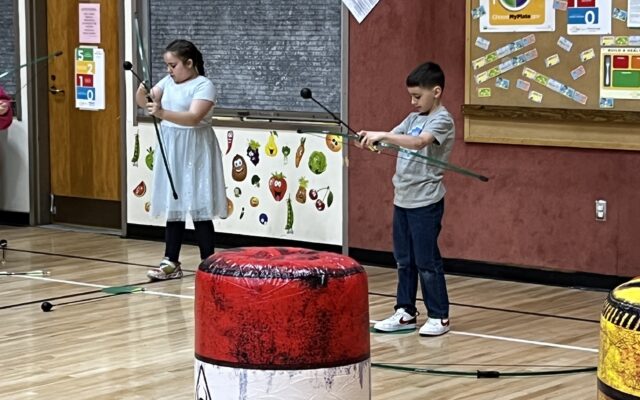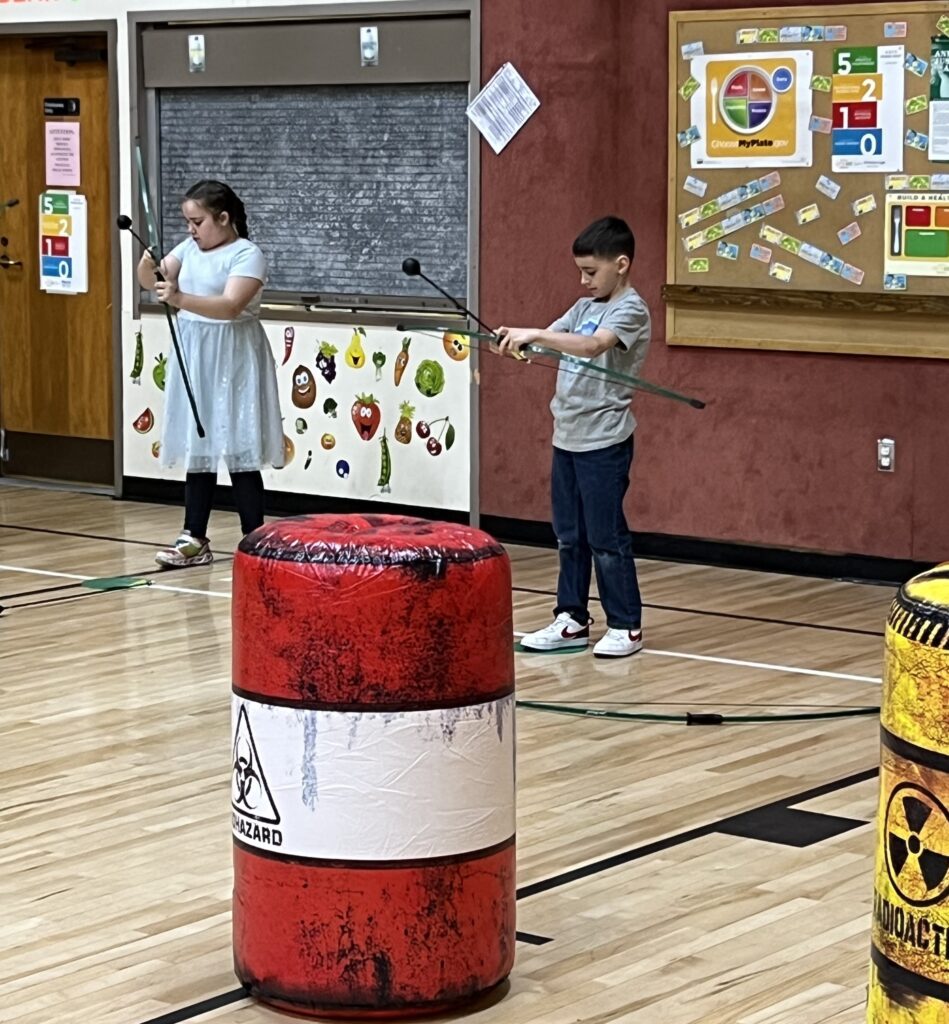
SAD 41, RSU 68 schools among 100-plus to receive funding for outdoor learning projects
In its third and most expansive year yet, the Mini-Grants for Outdoor Learning Program has helped over 30,000 students from schools in every county in Maine get outside the classroom and into the natural world. The Maine Environmental Education Association distributed mini-grants to teachers for up to $1,500 each to spend on everything from purchase equipment for outdoor recreation, rain and snow gear, outdoor classroom building supplies, field trips, educator professional development, and garden and science exploration. Teachers developed new and creative ways to engage students in the outdoors and also built upon ongoing projects from the grant program’s last two annual cycles.
Grant recipient Dawn McLaughlin of Milo Elementary and Brownville Elementary had the opportunity to play inflatable archery tag at several summer camps she previously worked at. “I thought it would be fun to bring this game back to my kiddos,†she said.
McLaughlin purchased the soft archery equipment, inflatable barrels, and safety goggles. “My students love archery so archery tag is another level where they use the skills they have learned in a previous lesson,†she said. “The students have so much fun aiming at the targets that students are hiding behind.â€
This year, the grant program supported more youth and teachers than ever before. The program began in 2020 as a response to the COVID-19 pandemic to help teachers bring their classrooms safely outdoors. During the 2022-23 cycle, 105 schools in all 16 counties received a total of $153,083.63 with an upward trend in the number of applications from Aroostook, Lincoln, Oxford, and Washington counties. In just three years, we have funded projects in over 35 percent of all public schools in Maine, distributing $483,651.11 to 369 applicants, 308 unique teachers, and 233 different schools.

OUTDOOR LEARNING — The Maine Environmental Education Association’s Mini-Grants for Outdoor Learning Program funded soft archery equipment, inflatable barrels, and safety goggles for Brownville Elementary students.
A major goal of the mini-grants program is prioritizing our schools that have the greatest need, such as schools with 80-100 percent free and reduced lunch rates. “MEEA has funded 46 projects in these schools over the past three years,†saidMEEA Co-Director Olivia Griset.
Two of those schools, Milo and Brownville Elementary, received physical education equipment through the grant funding. “Thank you for the opportunity to purchase cool equipment for our kiddos,†McLaughlin said.
MEEA also values funding teachers over multiple grant cycles, like RSU 68 Superintendent Stacy Shorey who used the funding this year to help build the school greenhouse for summer school students in conjunction with the UMaine Cooperative Extension.
“One student noted that she loves seeing all the flowers that they grow around the school making it beautiful,†Shorey said.
Last year, Shorey used the funding to purchase a flower ensemble with in-ground mounts for outdoor music making in the preK-K playground. “We are beginning with instruments geared toward elementary students and hope within four or five years to have outdoor instruments available for our middle school students too,†she said.
MEEA continues to invest and encourage one of RSU 68’s missions to support free play and creativity through outdoor learning.
According to the Maine Environmental Literacy Plan, which MEEA was an integral partner in writing, learning outside improves students’ academic performance, advances critical thinking skills, and supports their personal growth, confidence, autonomy, and leadership skills. Taking class outside also improves students’ overall health and wellbeing, like decreasing stress and anger and improving physical health and relationship skills.
Teachers like Jessica Archer of Orono Middle School have seen firsthand how students’ social, emotional, and academic wellbeing flourish as a result of learning outside. Archer used the funding to support the school-community garden and noticed working in the garden supported students who face challenges inside the indoor classroom.
“Students who might typically struggle in a traditional learning environment find the garden to be a learning space with many opportunities to not only learn something new, but take part in helping younger students learn as well as to care for the land,†she said.
MEEA Co-Director Olivia Griset is excited that the program has grown so much in its third year that it now has served over 350 educators in schools in all 16 counties. “We have some of the most amazing, dedicated and skilled teachers in Maine who are deeply committed to increasing their student’s health, well being, and connection to place through outdoor learning initiatives,†Griset said.
MEEA Director of Schools and Community Partnerships Anna Sommo says that teachers “are essential to the health of the entire community, and supporting their work in bringing youth outdoors helps us all thrive. It is exciting to see so many creative projects from all over the state for students of all ages! MEEA Mini Grants are a unique opportunity to enhance these projects as well as connect educators to the wider environmental education network and one another. I am honored to amplify this great work.â€
During the 2023-24 academic year, we plan to target outreach about the program to the schools that have not received funding from us before, along with continued outreach to schools in the Aroostook, Lincoln, Piscataquis, and Waldo counties as they’ve historically been underfunded through this program. Connecting with these amazing educators, sharing their stories and ideas with other educators, and supporting them through funding and training is critical in ensuring that every child in Maine has access to the outdoors.
We are excited to continue this vital support for teachers in the 2023-24 school year. Applications for the 2023-24 grant cycle will be available online through Oct. 13. We encourage anyone interested in applying for next year’s support to reach out to us at anna@meeassociation.org. If you or your organization are interested in donating to this fund, please contact grants@meeassociation.org.